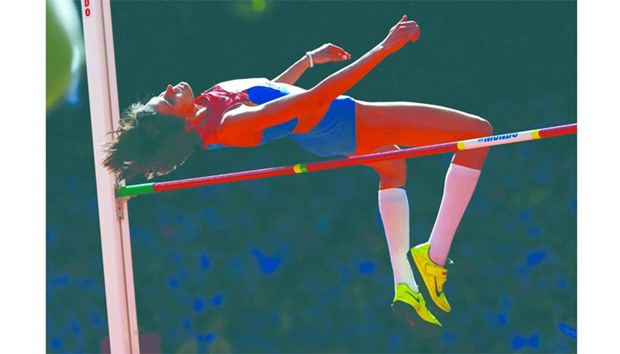Russian high-jump Olympic champion Anna Chicherova yesterday vowed to clear her name after testing positive for doping at the 2008 Beijing Olympics, casting doubt on her participation in Rio.
Russia’s Olympic Committee (ROC) said on Tuesday that 14 of its athletes at the 2008 Beijing Olympics, including Chicherova and nine other medallists, tested positive in new tests on samples given during the Games, as Moscow faces allegations of state-organised doping.
“For me it’s the most complete shock. I can’t explain how it could have happened,” said Chicherova, who hopes to compete in August’s Rio Games if Russia’s team is allowed to enter.
Chicherova is the reigning Olympic high-jump champion after winning gold in London in 2012. She won the bronze in Beijing. “I was always sure what supplements and medicines I was using,” she said. “I hope I can defend my name as clean.”
The announcement came after the International Olympic Committee (IOC) said that 31 athletes from 12 countries had failed doping tests of their samples from the Beijing Games.
While Russia has not officially named its athletes, a list was aired on Match TV channel and Chicherova confirmed she had indeed received notification that her sample showed evidence of banned substances.
She described her present situation of waiting for the final results after a second sample is tested on May 31 or June 1 in Switzerland as “very painful and unpleasant”.
The Russian athletics federation said on Tuesday that if allowed to compete at Rio, it would bar any athlete found to have used doping in previous years. The world athletics governing body IAAF is set to rule next month whether to lift Russia’s provisional suspension from Rio over evidence of state-sponsoring doping. A delegation from the IAAF is set to visit Russia for the final time before deciding whether it can take part in the Olympics, the Russian athletics federation president Dmitry Shlyakhtin said.
The latest doping revelations came as Russia is reeling from damning accusations by the former head of Russia’s anti-doping laboratory at the Sochi Winter Games, Grigory Rodchenkov. He told the New York Times of a systematic state-organised scheme to get round anti-doping rules, including at least 15 medallists at the 2014 Sochi Olympics as well as the sports ministry and the FSB security service.
The Russian athletics doping scandal was earlier brought to light by whistle-blowers, including runner Yulia Stepanova and her husband Vitaly Stepanov, a former employee of Russian anti-doping agency RUSADA.

Anna Chicherova
